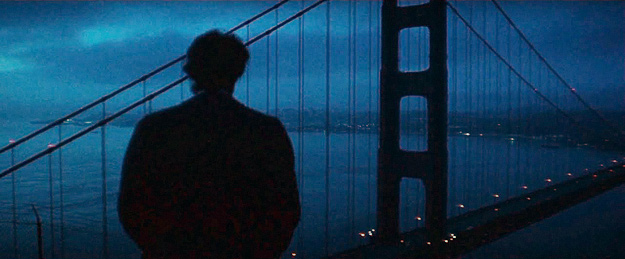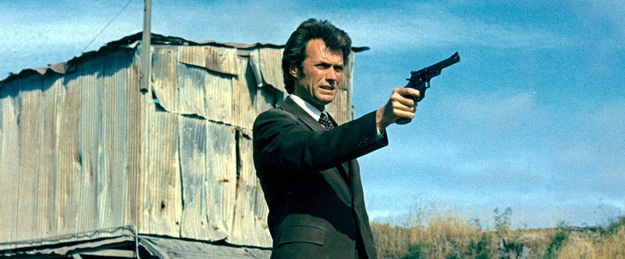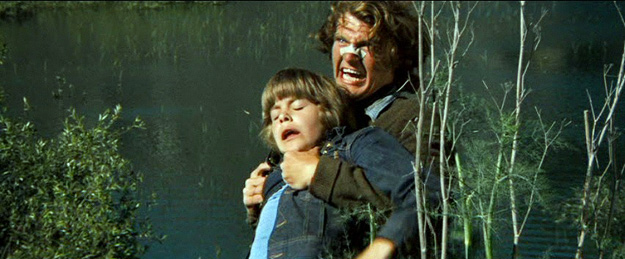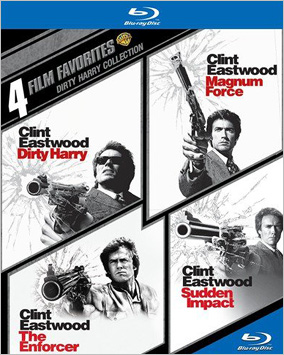
The Digital Bits: Do you believe Dirty Harry has been well represented on home video?
Leva: Having produced the most recent special features for the Dirty Harry series in 2008, I’m the wrong one to ask! But I think they turned out well. We got a huge pool of interviews—as usual, when you call saying you’re working with Clint, no one says no. And we tried to match the style of the documentaries to the era of the films, with flashy ‘70s graphics and Lalo Schifrin-esque music. I think they hold up well.
The Digital Bits: Gary, can you discuss your latest project?
Leva: We produced Clint Eastwood: A Cinematic Legacy over the past couple of years—it’s a nine-part documentary series looking at different aspects of Clint’s career on the 50th anniversary of his debut as a film director in 1971. It was a wonderful project to work on, with Clint’s direct cooperation and feedback, and it was thrilling for us to see it on HBO Max. If you count each episode of the new series as its own documentary, which is how we designed them, it means I’ve produced 27 documentaries on Clint’s career. I should be an expert by now!
The Digital Bits: How do the Dirty Harry sequels compare to the original movie?
Pfeiffer: Well, it’s similar to the original Planet of the Apes series. The first one was so good, there was nowhere to go but down. However, that doesn’t mean the sequels weren’t highly entertaining and successful. Most interesting was the first sequel, Magnum Force, directed by Ted Post, who Eastwood had worked with on Rawhide and Hang ‘Em High. What makes it unique is that the script, which was written by future directors John Milius and Michael Cimino, seems to go to great lengths to reel Harry Callahan in from charges that the character was inherently fascist. This time around, it’s Harry who defends the system and the constitution by taking on a group of rogue vigilante cops. It’s the strongest of the sequels because it at least addresses a societal issue. The other sequels tended to have cookie-cutter villain types and scenes that seemed designed simply to invent a new tag line for audiences to repeat. It worked. In the case of the third sequel, Sudden Impact, Harry’s utterance of “Make my day” made it into popular culture. President Ronald Reagan even used it to humorously bait his political rivals.
Leva: I think Magnum Force is terrific, with that John Milius script and Hal Holbrook having such a great time playing the bad guy, something he rarely got to do on screen.
McGilligan: The sequels get progressively stupider, although they have their moments if you love the character of Dirty Harry (I don’t). The second, less fascistic, is very well directed by Ted Post, all things considered, and Tyne Daly in the third does the heavy lifting as Clint’s sidekick. But the ideas behind the sequels and too many Clint films can be boiled down to "A man’s gotta do what a man’s gotta do ... with a gun," and I don’t find that a very serious or intelligent lifelong theme.
The Digital Bits: How would you describe Dirty Harry to someone who has never seen it?
Leva: I would call Dirty Harry an urban Western about an obsessed cop hellbent on justice.
Pfeiffer: Beyond the rather academic aspects to its merits, on the most basic level it’s highly entertaining and an example of the no-nonsense style of filmmaking that Siegel and Eastwood excelled in. No budget excesses or expensive special effects—just a good story told in a compelling manner.
McGilligan: Dirty Harry is one of the best cop movies ever made with many touches, good and bad, which mirror that historical period of reality as well as the fictional worlds of early 70s genre moviemaking. I think the film only falls down where it posits Clint as a fantasy superhero ("I alone can fix it!"), which is said in many ways throughout the film, and especially towards the end. But most people don’t care about that complaint because Scorpio is such a creep.
The Digital Bits: What do you think is the legacy of Dirty Harry?
Pfeiffer: The film is more than an expertly made crime thriller. It’s a sociological time capsule that can be studied in an academic sense to understand where America was at in the early 1970s.
Leva: One of the legacies of Dirty Harry is the scores of cop movies made since that incorporate the irreverence and sense of humor that Harry Callahan brings to the film.
McGilligan: Dirty Harry is one of Clint’s definitive films in terms of its enduring popularity and its influence on his persona and the rest of his career. If you had to see one Clint Eastwood film, this might be it. If you are the rare person who has never seen a Clint Eastwood film and wonder what all the fuss is about, this would be a good place to start.
The Digital Bits: Thank you—Gary, Patrick, and Lee—for sharing your thoughts about Dirty Harry on the occasion of its 50th anniversary.
---END---

IMAGES:
Selected images copyright/courtesy Malpaso Company, National Screen Service, San Francisco Chronicle, Warner Bros., Warner Home Video.
SOURCES/REFERENCES:
The primary references for this project were the motion picture Dirty Harry (Warner Bros., 1971), regional newspaper coverage, trade reports published in Boxoffice and Variety, and interviews conducted by the author. All figures and data pertain to North America (i.e. United States and Canada) except where stated otherwise.
SPECIAL THANKS:
Al Alvarez, David Ayers, Don Beelik, Stephen Bjork, Mark Lensenmayer, Gary Leva, Stan Malone, Adam Martin (Cinema Tour), Patrick McGilligan, W.R. Miller, Lee Pfeiffer, and a very special thank-you to the librarians, genealogists and private researchers who assisted with this project, in particular Laura Baas (State Library and Archives of Florida), Tiffany Bargas (Merced County Library), Bonnie Battaglia and Gavin Furman (El Dorado County Library), Katie Biehl (Bozeman Public Library), Deb Bier (Peoria Public Library), Bonnie (Hamilton Public Library), Linda Bridges (Live Oak Public Libraries), Jennifer Browne (Middle Georgia Regional Library), Michelle Burkhart (Michigan City Public Library), Aggie Burstein (Olympia Timberland Library), Sherri Camp (Topeka Shawnee County Library), Laurie Carroll (City of Duluth Library), Jose E. Castro (Kitsap Regional Library), Morgan Chance (Texarkana Public Library), Chuck (Jones Memorial Library), Scott Clark (Kitchener Public Library), Clara (Providence Public Library), Julie Colby (Danville Public Library), Caitlyn Cook (New Jersey State Library), Dan (New Bedford Free Public Library), Tabitha Davis (Pueblo-City-County Library), Reynaldo De Guzman (Solano County Library), Judy Dombrowski (Centre County Library and Historical Museum), Margaret Dunlap (Richland Library), Erin Edwards (Carnegie Library for Local History), Lunden England (Norman Public Library), Sandra Enskat (St. Catharines Public Library), Robin Everett (Wyoming State Archives), Laura Fazekas (Chapin Memorial Library), Ann Gagnier (Athens-Clarke County Library), Whitney Gaines (Columbus Public Library), Anne Girouard (Daniel Boone Regional Library), Carl Hamlin (Cabell County Public Library), Brian Hargett (Lee County Library), Vanessa Harris (Waukegan Public Library), Debra James (Jonesboro Public Library), Jeanne (Bristol Public Library), Jennifer (Alachua County Library District), Jess (Terrebonne Parish Library), Leigh Anne Johnson (Indiana State Library), Jordan (London Public Library), Julia (Halifax Public Libraries), Amy Kastigar (Ohio County Public Library), Matt Kendall (Yakima Valley Libraries), James Kettel (Boyd County Public Library), Patrick Kilmer (Jefferson-Madison Regional Library), Kim (Dauphin County Library System), Anna Kimball (Belleville Public Library), Kaitlin Kirkland (Midland County Public Libraries), Dyron Knick (Roanoke Valley Libraries), Michael Lara (San Jose Public Library), Philippe Legault (Bibliothéque et Archives nationales du Québec), Molly Luby (Chapel Hill Public Library), Anne Marie (Boise Public Library), Monique Matta (San Luis Obispo Library), Genevieve Maxwell (Academy of Motion Picture Arts and Sciences), Grace May (Forsyth County Public Library), Nick McCavitt (Falmouth Public Library), Alex Merrill (Kalamazoo Public Library), Michael Miller (Sherman Public Library), Nancy Miller (Rochester Public Library), Will Miner (Grand Rapids Public Library), Sana Moulder (Cumberland County Public Library), Katherine Muto (Osterhout Free Library), Jody Osicki (Saint John Free Public Library), Carrie Ottow (Corvallis-Benton County Public Library), Ann Panthen (Champaign County Historical Archives), Debra Jean Pfendler (Stark Library), Amy Pfifferling-Irons and Ambar Alvarez (Elkhart Public Library), Roxanne Puder (Onslow County Public Library), Alison Purgiel (Muskegon Area District Library), Tiffany R. (Moorhead Public Library), Suzette Raney (Chattanooga Public Library), Reference Staff (Albany County Public Library), Reference Staff (Erie County Public Library), Reference Staff (Portland Public Library), Stephen Rice (Connecticut State Library), Emily Rundle (Jervis Public Library), Desirée Sharland (Thompson Library, University of Michigan-Flint), Elena Smith (California State Library), Erica Sodeyama (Grand Forks Public Library), Joyce Sonnier (Calcasieu Parish Public Library), Susan (Buffalo & Erie County Public Library), Sean Sutcliffe (Waco McLennan County Library), Beth Swenson (Idaho Falls Public Library), Fiona Swift (Public Libraries of Saginaw), Leah Tams (Durham County Library), Julie Thompson (Washington State Library), Tim (Jackson District Library), Kate Towers (Stanislaus County Library), Jace Turner (Santa Barbara Library), Rachele Vaughan (Tulsa City-County Library), Esther Vorhauer (Cambria County Library), Galen Webb (Fort Smith Public Library), Christine Weislo (Anderson County Library), Darla Welshons (Ann Arbor District Library), Abigail Williams (Utica Public Library), Robin E. Yarzab (Parkersburg & Wood County Public Library, Carol Zoladz (Kankakee Public Library).
IN MEMORIAM
- Gordon Bau (makeup supervisor), 1907-1975
- Dale Hennesy (art director), 1926-1981
- Maurice S. Argent (“Sid Kleinman”), 1916-1981
- Woodrow Parfrey (“Mr. Jaffe”), 1922-1984
- James Nolan (“Liquor Proprietor”), 1915-1985
- Craig Kelly (“Sgt. Reineke”), 1907-1991
- Don Siegel (director), 1912-1991
- William Randall (sound), 1929-1995
- Harry Guardino (“Bressler”), 1925-1995
- Harry Julian Fink (screenplay), 1923-2001
- John Mitchum (“De Georgio”), 1919-2001
- Dean Riesner (screenplay), 1918-2002
- Ruth Kobart (“Bus Driver”), 1924-2002
- William Paterson (“Bannerman”), 1919-2003
- John Vernon (“The Mayor”), 1932-2005
- Lyn Edgington (“Norma”), 1939-2005
- John Larch (“Chief”), 1914-2005
- Carl Pingitore (associate producer/editor), 1924-2008
- Mae Mercer (“Mrs. Russell”), 1932-2008
- Bruce Surtees (director of photography), 1937-2012
- Jo De Winter (“Miss Willis”), 1921-2016
- Robert Daley (executive producer), 19??-2016
- Bill Gold (key art/promotional material illustrator), 1921-2018
- Reni Santoni (“Chico”), 1938-2020

- Michael Coate
Michael Coate can be reached via e-mail through this link. (You can also follow Michael on social media at these links: Twitter and Facebook)





